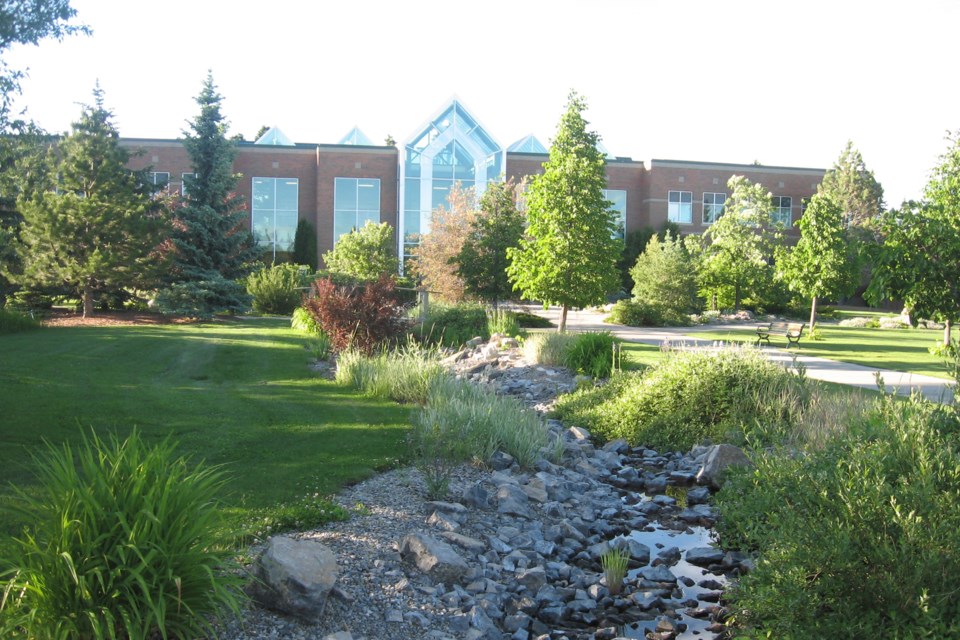OLDS – The Olds College of Agriculture & Technology is hosting its first-ever agrivoltaics – allowing solar panels on agricultural land – conference this Thursday, June 26.
Officially called Advancing Agrivoltaics for Alberta’s Sustainable Future, the conference will be held from 8:30 a.m. to 4:30 p.m. in the college’s Alumni Centre. It will be attended by farmers, provincial officials, researchers and solar developers.
Speakers will include Janna Grier, an Alberta farmer and co-founder of Solar Sheep who has grazed sheep under solar panels..
The goal is to promote the idea that solar projects and agriculture can share the same land and be mutually beneficial to farmers and those in the solar industry.
“It’s our strong contention that we’re not losing farms to solar projects,” Patrick Gossage, board chair of Agrivoltaics Canada, is quoted as saying in a news release.
“We’re losing them because the next generation of farmers can see how hard it’s becoming to make a living. It’s our strong feeling that agrivoltaics will dramatically change these on-farm economics by providing a lifeline to keep your name on the family farm and continue your farming heritage.”
A boom in solar and wind projects in Alberta during the past decade sparked fears by farmers and rural residents about losing prime agricultural land.
Last year, the provincial government ruled that projects cannot proceed on Class 1 and Class 2 farmland unless they demonstrate they can coexist with crops and/or livestock.
Gossage said what some people might see as a restriction is instead an opportunity to turn Alberta into a national leader in agrivoltaics.
“We want to extoll the virtues of agrivoltaics as a means of economic diversification for farmers that puts more money in their pockets so they have predictable cash flows they can use to subsidize their farming practice – and maybe most importantly, not have to sell the family farm to a big conglomerate.”
Research has indicated that factors such as shade under solar panels can create microclimates that promote higher humidity and crop growth, Gossage said.
“The big counter argument to solar has always been you’re competing with farmers and taking large swaths of farmland out of production. Agrivoltaics is the antidote to that.”
Olds College Centre for Innovation (OCCI) is in the early stages of planning what it hopes will become a multi-year research program that will help guide the growth of agrivoltaics in Canada.
It will include a survey of up to 500 farmers across Alberta, said Semeton Amosu, a research associate and soil scientist with the Environmental Stewardship Applied Research department at OCCI.
The two-phase project is being planned by Olds College and the University of Alberta in order to obtain perspectives from farmers and ranchers about agrivoltaics.
“You want to find out how many producers are aware of agrivoltaics. What is their perception? What is their disposition toward solar projects,” he’s quoted as saying in the news release.
The first phase will involve a comprehensive survey of producers to assess awareness, knowledge, perceptions and concerns about agrivoltaics. The survey will also address uncertainties and concerns related to legal considerations or agricultural insurance issues.
Olds College is also preparing a comprehensive report on the current status of agrivoltaics in Alberta that is expected to be completed by September.
“It'll sum up the total output regarding energy production and the households that will be supplied, and also the potential for agricultural production. It will list all of the solar projects that are at different stages in Alberta, and those that are engaged in agrivoltaics,” Amosu is quoted as saying.
Researchers are also engaged in discussions with solar companies and farmers to explore potential studies. Gossage said providing reliable scientific data about agrivoltaics is crucial for the future of the sector because it enables everyone from farmers to regulators to make informed decisions.
“The credibility Olds College has in the farming community is something we want to lean on. Agrivoltaics is a relatively new concept, and it takes time to socialize these new concepts, but having Olds College as a partner, helping us fight this fight, is invaluable.”



